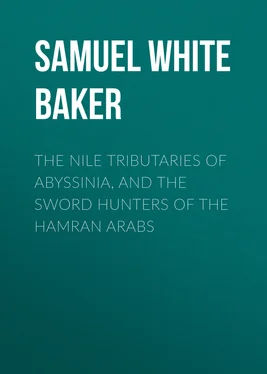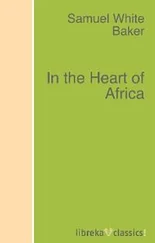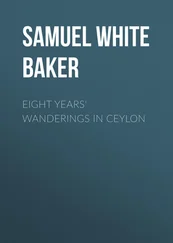Samuel White Baker - The Nile Tributaries of Abyssinia, and the Sword Hunters of the Hamran Arabs
Здесь есть возможность читать онлайн «Samuel White Baker - The Nile Tributaries of Abyssinia, and the Sword Hunters of the Hamran Arabs» — ознакомительный отрывок электронной книги совершенно бесплатно, а после прочтения отрывка купить полную версию. В некоторых случаях можно слушать аудио, скачать через торрент в формате fb2 и присутствует краткое содержание. Жанр: Путешествия и география, История, foreign_edu, foreign_antique, foreign_prose, на английском языке. Описание произведения, (предисловие) а так же отзывы посетителей доступны на портале библиотеки ЛибКат.
- Название:The Nile Tributaries of Abyssinia, and the Sword Hunters of the Hamran Arabs
- Автор:
- Жанр:
- Год:неизвестен
- ISBN:нет данных
- Рейтинг книги:3 / 5. Голосов: 1
-
Избранное:Добавить в избранное
- Отзывы:
-
Ваша оценка:
- 60
- 1
- 2
- 3
- 4
- 5
The Nile Tributaries of Abyssinia, and the Sword Hunters of the Hamran Arabs: краткое содержание, описание и аннотация
Предлагаем к чтению аннотацию, описание, краткое содержание или предисловие (зависит от того, что написал сам автор книги «The Nile Tributaries of Abyssinia, and the Sword Hunters of the Hamran Arabs»). Если вы не нашли необходимую информацию о книге — напишите в комментариях, мы постараемся отыскать её.
The Nile Tributaries of Abyssinia, and the Sword Hunters of the Hamran Arabs — читать онлайн ознакомительный отрывок
Ниже представлен текст книги, разбитый по страницам. Система сохранения места последней прочитанной страницы, позволяет с удобством читать онлайн бесплатно книгу «The Nile Tributaries of Abyssinia, and the Sword Hunters of the Hamran Arabs», без необходимости каждый раз заново искать на чём Вы остановились. Поставьте закладку, и сможете в любой момент перейти на страницу, на которой закончили чтение.
Интервал:
Закладка:
Cassala is rich in hyaenas, and the night was passed in the discordant howling of these disgusting but useful animals: they are the scavengers of the country, devouring every species of filth, and clearing all carrion from the earth. Without the hyaenas and vultures, the neighbourhood of a Nubian village would be unbearable; it is the idle custom of the people to leave unburied all animals that die. Thus, among the numerous flocks and herds, the casualties would create a pestilence were it not for the birds and beasts of prey.
On the following morning the fever had yielded to quinine, and we were enabled to receive a round of visits—the governor and suite, Elias Bey, the doctor and a friend, and, lastly, Malem Georgis, an elderly Greek merchant, who, with great hospitality, insisted upon our quitting the sultry tent and sharing his own roof. We therefore became his guests in a most comfortable house for some days. Our Turk, Hadji Achmet, returned on his way to Berber; we discharged our camels, and prepared – to start afresh from this point for the Nile tributaries of Abyssinia.
CHAPTER IV
ROUTE FROM CASSALA TO SOUAKIM
BY dead reckoning, Cassala is ninety-three miles S.S.E. of Gozerajup, or about 340 miles from Berber. We had ridden about 710 miles from Korosko, 630 miles of which had been through scorching deserts during the hottest season. We were, therefore, thankful to exchange the intense heat of the tent for a solid roof, and to rest for a short time in the picturesque country of Taka.
The direct route to Cassala, the capital of Taka, should be from Suez to Souakim, on the Red Sea, and from thence in sixteen days, by camel. Thus, were there a line from Suez to Souakim by steamers, similar to that already established to Jedda, Cassala would be only twenty-two days' journey from Cairo. At present, the arrival of steamers at Souakim is entirely uncertain; therefore the trade of the country is paralysed by the apathy of the Egyptian Government. The Abdul Azziz Company run their steamers regularly from Suez to Jedda; and, although they advertise Souakim as a port of call, there is no dependence to be placed upon the announcement; therefore, all merchants are afraid not only of delay, but of high warehouse charges at Souakim. The latter port is only four days' steaming from Suez, and, being the most central depot for all merchandise both to and from Upper Egypt, it would become a point of great importance were regular means of transport established.
Cotton of excellent quality may be grown to an unlimited amount in the provinces of Upper Egypt, and could be delivered at Souakim at a trifling cost of transport. A large quantity of gum arabic is collected throughout this country, which sells in Cassala at 20 piastres (4s. 2d.) the cantar of 100 lbs. There are three varieties, produced from various mimosas; the finest quality is gathered in the province of Kordofan, but I subsequently met with large quantities of this species in the Base country. Senna grows wild in the deserts, but the low price hardly pays for the cost of collection. There are several varieties; that with extremely narrow and sharp-pointed leaves is preferred. It grows in sandy situations where few plants would exist. The bush seldom exceeds three feet in height, and is generally below that standard; but it is exceedingly thick, and rich in a pale green foliage, which is a strong temptation to the hungry camel. Curiously, this purgative plant is the animal's bonne bouche, and is considered most nourishing as fodder.
The exports of the Soudan are limited to gum arabic, ivory, hides, senna, and bees'-wax; the latter is the produce of Abyssinia. These articles are generally collected by travelling native traders, who sell to the larger merchants resident in Cassala and Khartoum, the two principal towns of the Soudan. The bazaar in Cassala was poor, as the principal articles were those of low price, adapted to the wants of the Arabs, who flock to the capital as a small London, to make their purchases of cloths, perfumery for the women, copper cooking pots, &c.
The fortifications of the town, although useless against cannon, are considered by the Arabs as impregnable. The walls are of solid mud and sun-baked bricks, carefully loopholed for musketry, while a deep fosse, by which it is surrounded, is a safeguard against a sudden surprise.
These engineering precautions were rendered necessary by the ferocity of the Arabs, who fought the Egyptians with great determination for some years before they were finally subdued. Although the weapons of all the Arab tribes are the simple sword and lance, they defended their country against the regular troops of Egypt until they were completely defeated by a scarcity of water, against which there could be no resistance. The Egyptians turned the course of the river Gash, and entirely shut off the supply from one portion of the country, while they inundated another. This was effected by an immense dam, formed of the stems of the dome palms, as a double row of piles, while the interior was rendered water-tight by a lining of matting filled up with sand.
Cassala was built about twenty years before I visited the country, after Taka had been conquered and annexed to Egypt. The general annexation of the Soudan and the submission of the numerous Arab tribes to the Viceroy have been the first steps necessary to the improvement of the country. Although the Egyptians are hard masters, and do not trouble themselves about the future well-being of the conquered races, it must be remembered that, prior to the annexation, all the tribes were at war among themselves. There was neither government nor law; thus the whole country was closed to Europeans. At present, there is no more danger in travelling in Upper Egypt than in crossing Hyde Park after dark, provided the traveller be just and courteous. At the time of my visit to Cassala in 1861, the Arab tribes were separately governed by their own chiefs or sheiks, who were responsible to the Egyptian authorities for the taxes due from their people: since that period, the entire tribes of all denominations have been placed under the authority of that grand old Arab patriarch Achmet Abou Sinn, to be hereafter mentioned. The Sheik Moosa, of the Hadendowa tribe, was in prison during our stay in that country, for some breach of discipline in his dealings with the Egyptian Government. The iron hand of despotism has produced a marvellous change among the Arabs, who are rendered utterly powerless by the system of government adopted by the Egyptians; unfortunately, this harsh system has the effect of paralysing all industry.
The principal object of Turks and Egyptians in annexation, is to increase their power of taxation by gaining an additional number of subjects. Thus, although many advantages have accrued to the Arab provinces of Nubia through Egyptian rule, there exists an amount of mistrust between the governed and the governing. Not only are the camels, cattle, and sheep subjected to a tax, but every attempt at cultivation is thwarted by the authorities, who impose a fine or tax upon the superficia1 area of the cultivated land. Thus, no one will cultivate more than is absolutely necessary, as he dreads the difficulties that the broad acres of waving crops would entail upon his family. The bona fide tax is a bagatelle to the amounts squeezed from him by the extortionate soldiery, who are the agents employed by the sheik; these must have their share of the plunder, in excess of the amount to be delivered to their employer; he, also, must have his plunder before he parts with the bags of dollars to the governor of the province. Thus the unfortunate cultivator is ground down; should he refuse to pay the necessary "baksheesh" or present to the tax-collectors, some false charge is trumped up against him, and he is thrown into prison. As a green field is an attraction to a flight of locusts in their desolating voyage, so is a luxuriant farm in the Soudan a point for the tax-collectors of Upper Egypt. I have frequently ridden several days' journey through a succession of empty villages, deserted by the inhabitants upon the report of the soldiers' approach; the women and children, goats and cattle, camels and asses, have all been removed into the wilderness for refuge, while their crops of corn have been left standing for the plunderers, who would be too idle to reap and thrash the grain.
Читать дальшеИнтервал:
Закладка:
Похожие книги на «The Nile Tributaries of Abyssinia, and the Sword Hunters of the Hamran Arabs»
Представляем Вашему вниманию похожие книги на «The Nile Tributaries of Abyssinia, and the Sword Hunters of the Hamran Arabs» списком для выбора. Мы отобрали схожую по названию и смыслу литературу в надежде предоставить читателям больше вариантов отыскать новые, интересные, ещё непрочитанные произведения.
Обсуждение, отзывы о книге «The Nile Tributaries of Abyssinia, and the Sword Hunters of the Hamran Arabs» и просто собственные мнения читателей. Оставьте ваши комментарии, напишите, что Вы думаете о произведении, его смысле или главных героях. Укажите что конкретно понравилось, а что нет, и почему Вы так считаете.












